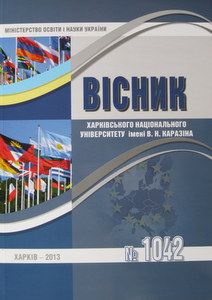Global demographic problem of the present: the state and the prospects
Abstract
This article considers Thomas Malthus’s principles of population and the opinions of the Rome Club members as tothe demographic problem. The article notes that at the beginning of the existence of the club its members paid their attention mainly to the contradictions between the society and the nature. But later accumulating the knowledge of the general current affairs on the planet, they came to conclusion about a necessity to prioritize social and mainly demographic problems. These are the Rome Club members who raised the issue of the overpopulation of the Earth on a scientific level 50 years ago. The article also analyzes contemporary dynamics of world population and identifies the direct factors that contribute to its rapid growth in the developing countries (early marriages, influence of religion, traditions in creating large families, prohibitions of abortions etc). We estimate trends in the world population dynamics under the impact of UN programs on family planning that are carried out by the “periphery” countries with the financial support of international organizations. We consider prediction limits of world population growth that are defined with the usage of mathematical models and set by different specialists. We also justify measures as tosolving the problem of the future overpopulation of the Earth that includes the increase of the level of education and public health service in developing countries; the implementation of the Concept of a new world order between the “core” countries of the and the “periphery”; transition to the planned world development based on the model of global equilibrium.
Downloads
References
Доклад Генерального секретаря (E/CN.9/2011/5).Нью-Йорк : ООН, 2011.
Иванов С .В. Снижение рождаемости в странах Юга: политика вокруг политики / С. В. Иванов //Экономический журнал ВШЭ. – 2011. – № 4. – С. 565-582
Капица С. Мои воспоминания / С. Капица [Електронний ресурс]. – Режим доступу : http://profilib.com/chtenie/29761/sergey-kapitsa-moi-vospominaniya-43.php
Капица С. П. Демографическая революция и будуще человечества / С. П. Капица // В мире науки. – 2004.– № 4 – С. 82-91.
Food and Agriculture Organization [Електронний ресурс]. – Режим доступу : http://www.fao.org.
Authors who publish with this journal agree to the following terms:
- Authors retain copyright and grant the journal right of first publication of this work under the terms of a license Creative Commons Attribution License 4.0 International (CC BY 4.0).
- Authors are able to enter into separate, additional contractual arrangements for the non-exclusive distribution of the journal's published version of the work (e.g., post it to an institutional repository or publish it in a book), with an acknowledgement of its initial publication in this journal.
- Authors are permitted and encouraged to post their work online (e.g., in institutional repositories or on their website) prior to and during the submission process, as it can lead to productive exchanges, as well as earlier and greater citation of published work.




